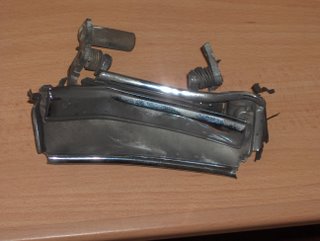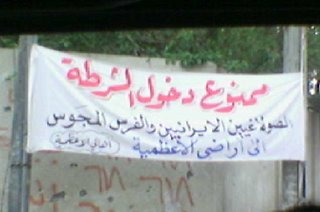As I rapidly near the end of my time in Iraq, I've been reviewing the reasons I came in the first place. I was motivated by a range of factors. In no particular order, here's a list of reasons people come to Iraq and how I relate.
Understand the situation first hand: With the level of media coverage devoted to Iraq, one can't help but wonder what the scene is really like on the ground. I wanted to see what was going on in Baghdad with my own eyes. In retrospect, this reason was vague and poorly conceived. Is it possible to know what's really going on in any warzone? From my concrete bubble I can't pretend to know Baghdad, let alone grasp the dynamics that are shaping the future of the country. This was not a major consideration, but it was a reason for coming.
The excitement of working in a warzone: I was surprised when a friend told me that this was an appeal of working in Baghdad. But it seems the threat of death entices a surprisingly large number of people to Iraq. "I couldn't work in Erbil, because its too boring," someone told me. I laughed and said how I relish my time in Erbil where a semi-normal existence is possible. Maybe the lesson is that one man's exhileration is another's fear.
Variety of experiences is healthy: I've often made choices based on the premise that more, different experience is generally a positive thing. Of course, there are plenty of experiences that I can rule out as counterproductive. In general, I think that a new challenge makes a better person. After a year in Iraq, I'm beggining to doubt this. I am concerned about the way that I absorb the lessons from these diverse experiences. If the lessons from the challenge is not synthesized or properly valued, the experience may be useless.
Career advancement: Because of the number of opportunities available in Iraq and the paucity of qualified people to fill them, there are many open posts for less experienced candidates. In some cases, the need for a body to fill the position creates employees who are tremendously incompetent. For example,
Michael Ledeen's daughter was horribly underqualified for her job and exhibited gross incompentence (I've heard other stories about her from those who were unfortunate enough to work with her). But I had relevent experience and compensated for holes in my background with motivation and good relations with coworkers who were eager to help and mentor me.
Money: Compensation in Iraq is exorbitant by any standard, and for many people this is the key reason behind their presence in Iraq. It is rarely the only reason and usually there are other motivating factors. For me, I can't complain that my bank account has grown significantly, though I do feel awkward about it. But even if the pay were comparable to similar posts in other countries, which is about half of what I now make, I would still have accepted the position. Actually, I've valued the R&R trips I've taken to Sri Lanka, Thailand, and Belgium/Holland more than the pay.
Making a difference: In the months before Operation Iraqi Freedom was launched I had major reservations about the war and attended anti-war protests. I am less opposed to the invasion now than I was three years ago. However, the legitimacy of the war is not relevant to my decision to come to Iraq or my opinion of the reconstruction efforts. There is important work that needs to be completed and I came to contribute to those efforts. The deeper question is whether I have contributed to these efforts in a unique and meaningful way, or if I have just filled a position that needed a body. My coworkers assure me that it is the former and that I have made a substantive contribution that is not pushing papers or routine. Unfortunately, I'm not convinced and feel like I could have done more.
Professional development: I thought that I would gain some crucial skills in Iraq. Foremost, I wanted to get my Arabic down. I have failed miserably at this and do not have any better grasp of the language than when I arrived. I also hoped that I would have more direction about my long-term career goals. Development projects bring a range of specialists together with unique backgrounds. I expected that after a year I would have enough models that I could comfortably choose a career path that suited me. I am now more uncertain than when I arrived. There are too many people doing important work here for me to choose one area of specialization. Consequently, the question "should I go to law school or business school or a program in IR" is more difficult to answer than it was a year ago. I will most likely be at graduate school in the fall, though I fear an uninspired two years of study. At the same time, I did gain some skills that I did not anticipate. I've developed and conducted numerous training sessions since I've been out here, and my ability as a facilitator and public speaker improved. My superhuman boss gave me a hand in the project management and I gained experience with project design when I took the lead in the developing the implementation plan.
Cultural understanding: One aspect of previous international work that I value is the cultural understanding I gain. In Yemen, I had long qat-fueled debates about the validity of Islam. In Israel, a Bedouin friend explained why the sedentary life traditional to a peasant is difficult to fit with tradition. I can't think of comparable experiences here. Iraqis tell me about their lives, their values, and their aspirations, but from the confines of the compound it seems remote. Also, Iraqis look at Westerners in a much different way than their counterparts in other Arab countries. I arrive with the baggage of an invading power, and Iraqis view me through that prism. Its not surprising that the non-Iraqi Arabs I work with have been more candid about their culture than Iraqis.
Complete change: Iraq has an almost romantic aura that draws people seeking a radical change in their life. There are plenty of people out here who do not fit the typical profile of the development professional, if there is such a thing. They come to Iraq because it is drastically different from anything they've done before. For example, there's the seasoned IT professional who worked in New York but grew tired of the city and his marriage. He came to Iraq though previously he had never travelled anywhere besides Europe. He sought a major paradigm shift that only a radical change of scenery could provide. This was not an appeal to me, though I did hope that I would grow from this experience.
Camraderie: I didn't come to Iraq to make friends. In fact, this was not on my radar. Though many people involved in security work say that this draws them to Iraq. In a warzone relationships take on a certain intensity. Describing his experience in the military, a security manager said that "you work together, sleep together, fight together, and fuck together." I can only relate to the work part, but I have bonded with the rest of the team in ways that I never thought possible. I have made lifelong friends in Iraq and that may be the most important thing I take away from this experience.






